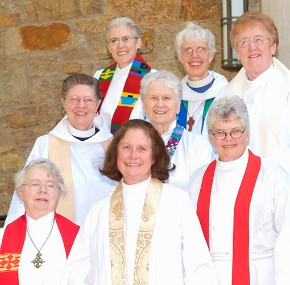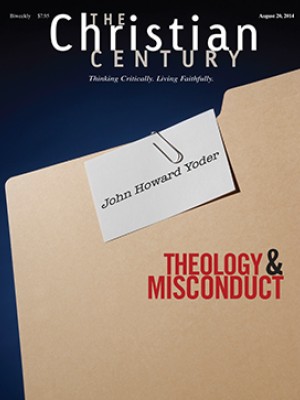The 'Philadelphia 11': Looking back on a breakthrough moment

On July 29, 1974, in Philadelphia, 11 women broke rank and were ordained as the first female priests in the Episcopal Church. They became known as the Philadelphia 11.
While there was no law explicitly prohibiting the ordination of women, there also was no law allowing it. After the Philadelphia action at the Church of the Advocate, the 11 women were deemed “irregularly” ordained, and Episcopal bishops warned the church not to recognize the women as priests.
Two years later, the Episcopal Church’s General Convention affirmed and authorized the ordination of women to the priesthood.
In the 40 years since, the Philadelphia 11 have taken varied paths.
Merrill Bittner After ordination: in 1976, announced that she would “no longer affiliate myself with the Protestant Episcopal Church in the United States of America.”
Read our latest issue or browse back issues.
Alla Bozarth-Campbell After ordination: founded Wisdom House, a Minneapolis-based interfaith spirituality center. Now: retired, writes poems as ministry.
Her advice for women in the church today: “If there are barriers, and yet the women feel called to those areas which are still blocked to them in their traditions, I would encourage them to do what the Roman Catholic women have been doing. And that is get together, pray together, pray for guidance together, and follow the guidance of the Holy Spirit as it emerges.”
Alison Cheek After ordination: served in St. Stephen’s Episcopal Church in Annandale, Virginia. Now retired.
Advice: “The advice I used to give women back at the time was, only get ordained if you can’t help it and if you want to change the church. And I think that still holds; I think it still isn’t always easy for woman priests.”
Emily Hewitt After ordination: became assistant professor of religion and education at Andover Newton Theological School (1973–1975). Now: retired from being chief judge of the United States Court of Federal Claims, October 2013.
Advice: “I cheer on the women, without whom the church, living as long as it is, would barely be able to go on. I mean, this is a lot of the muscle of the church.”
Carter Heyward After ordination: joined the faculty at the Episcopal Divinity School. Now: retired in 2005, helps run and teaches at a therapeutic horseback center.
Advice: “Stay aware of ways in which the church does and does not empower women to be fully who they are. And to really work to celebrate the things that have happened on our behalf and to really fight for the changes that are needed. And also to keep connection with other people who are struggling for justice.”
Suzanne Hiatt After ordination: was on the faculty of the Episcopal Divinity School until retirement. Died May 30, 2002.
Marie Moorefield After ordination: served as chaplain at the United Methodist Retirement Home in Topeka, Kansas (1973–1975). She returned to the Episcopal Church in the 1980s.
Jeannette Piccard After ordination: served in St. Paul, Minnesota, until 1981. Died May 17, 1981.
Betty Bone Schiess After ordination: served as chaplain at Syracuse University from 1976–1978. Now: retired, “sitting here at 91 with my 93-year-old husband, enjoying life.”
Advice: “I would certainly endorse what is already being endorsed, that is, to have women be in the public arena. Because what happens in the law of the country and everyplace else affects women, so they should have a say in what happens.”
Katrina Swanson After ordination: worked at St. Stephen’s Episcopal Church in St. Louis. Died August 27, 2005.
Nancy Wittig After ordination: did supply work for the Episcopal Diocese of Newark, New Jersey. Now: retired, with a part-time job at St. Peter Episcopal Church in Lakewood, Ohio.
Advice: “Don’t assume there’s no prejudice about women. Don’t assume just because you’re very smart and have a good education, that will pave the way. There will be a lot of bumps along the way. But don’t give up, stay faithful, show up, and remember it’s not your ministry, it’s Christ’s.” —RNS
This article was edited August 20, 2014.





